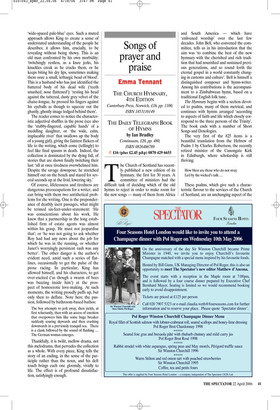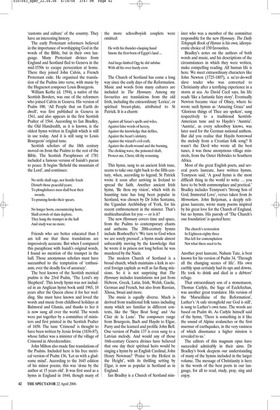Songs of prayer and praise
Emma Tennant
THE CHURCH HYMNARY, 4TH EDITION Canterbury Press, Norwich, £16, pp. 1100, ISBN 1853116149 THE DAILY TELEGRAPH BOOK OF HYMNS by Ian Bradley Continuum, £20, pp. 480, ISBN 0826486789 ✆ £16 (plus £2.45 p&p) 0870 429 6655 The Church of Scotland has recently published a new edition of its hymnary, the first for 30 years. A committee of ministers had the difficult task of deciding which of the old hymns to reject in order to make room for the new songs — many of them from Africa and South America — which have ‘enlivened worship’ over the last few decades. John Bell, who convened the committee, tells us in his introduction that the aim was ‘to combine the best of the new hymnary with the cherished and rich tradition that had nourished and sustained previous generations, and so sound forth the eternal gospel in a world constantly changing in customs and culture’. Bell is himself a distinguished composer and hymn-writer. Among his contributions is the accompaniment to a Zimbabwean hymn, based on a traditional English folk tune.
The Hymnary begins with a section devoted to psalms, many of them metrical, and continues with hymns arranged ‘according to aspects of faith and life which closely correspond to the three persons of the Trinity’. The book ends with a number of Short Songs and Doxologies.
The very first of the 825 items is a beautiful translation from the Hebrew of Psalm 1 by Charles Robertson, the recently retired minister of the Canongate Kirk in Edinburgh, where scholarship is still thriving:
How blest are those who do not stray Led by the wicked’s talk ...
These psalms, which give such a characteristic flavour to the services of the Church of Scotland, are an unchanging aspect of the ‘customs and culture’ of the country. They have an interesting history.
The early Protestant reformers believed in the importance of worshipping God in the words of the Bible, but in their own language. Many Protestant divines from England and Scotland fled to Geneva in the mid-1550s to escape persecution at home. There they joined John Calvin, a French Protestant exile. He organised the translation of the Psalms into verse, with music by the Huguenot composer Louis Bourgeois.
William Kethe (d. 1594), a native of the Scottish Borders, was one of the reformers who joined Calvin in Geneva. His version of Psalm 100, ‘All People that on Earth do dwell’, was first published in Geneva in 1561, and also appears in the first Scottish Psalter of 1564. According to Ian Bradley, the Old Hundredth, as it is known, is the oldest hymn written in English which is still in use today. And it is still sung to Louis Bourgeois’ original tune.
Scottish scholars of the 18th century moved on from the Psalms to the rest of the Bible. The Scottish Paraphrases of 1781 included a famous version of Isaiah’s paean to peace. It begins ‘Behold the mountain of the Lord’, and continues:
No strife shall rage, nor hostile feuds Disturb those peaceful years; To ploughshares men shall beat their swords, To pruning-hooks their spears.
No longer hosts, encountering hosts, Shall crowds of slain deplore. They hang the trumpet in the hall And study war no more.
Friends who are better educated than I am tell me that these translations are impressively accurate. But when I compared this paraphrase with Isaiah’s original words, I found no mention of the trumpet in the hall. Those anonymous scholars must have succumbed to the temptation of ‘enthusiasm, ever the deadly foe of accuracy’.
The best known of the Scottish metrical psalms is the 23rd Psalm, ‘The Lord’s my Shepherd’. This lovely hymn was not included in an Anglican hymn book until 1965, 18 years after the Queen chose it for her wedding. She must have known and loved the words and music from childhood holidays at Balmoral and Glamis, and thanks to her it is now sung all over the world. The words were put together by a committee of ministers and first printed in the Scottish Psalter of 1650. The tune ‘Crimond’ is thought to have been written by Jessie Irvine (1836-87), whose father was a minister of the village of Crimond in Aberdeenshire.
John Milton also made fine translations of the Psalms. Included here is his free metrical version of Psalm 136, ‘Let us with a gladsome mind’. According to the 1645 edition of his minor poems, this was ‘done by the author at 15 years old’. It was first used as a hymn in England in 1844, though many of the more schoolboyish couplets were omitted:
He with his thunder-clasping hand Smote the first-born of Egypt’s land ...
And large-limbed Ogg he did subdue With all his over-hardy crew.
The Church of Scotland has come a long way since the early days of the Reformation. Music and words from many cultures are included in The Hymnary. Among my favourites are translations from the old Irish, including the extraordinary ‘Lorica’, or spiritual breast-plate, attributed to St Patrick. It is a charm:
Against all Satan’s spells and wiles, Against false words of heresy, Against the knowledge that defiles, Against the heart’s idolatry, Against the wizard’s evil craft, Against the death-wound and the burning, The choking wave, the poisoned shaft, Protect me, Christ, till thy returning.
This hymn, sung to an ancient Irish tune, seems to take one right back to the fifth century, when, according to legend, St Patrick wrote it soon after arriving in Ireland to spread the faith. Another ancient Irish hymn, ‘Be thou my vision’, which with its haunting tune has long been popular in Scotland, was chosen by Dr John Sentamu, the Ugandan Archbishop of York, for his recent enthronement in the minster. That’s multiculturalism for you — or is it?
The new Hymnary covers time and space, from the Psalms to contemporary chants and anthems. The 20th-century hymns include Bonhoeffer’s ‘We turn to God when we are sorely pressed’, a hymn made almost unbearably moving by the knowledge that he wrote it in prison not long before he was murdered by the Nazis.
The modern Church of Scotland is a broad church, which maintains a kirk in several foreign capitals as well as far-flung missions. So it is not surprising that The Hymnary includes translations not just from Hebrew, Greek, Latin, Irish, Welsh, Gaelic, German and French, but also from Russian, Xhosa, Swazi and more.
The music is equally diverse. Much is derived from traditional folk tunes including many which are familiar in different contexts, like the ‘Skye Boat Song’ and ‘Au Clair de la Lune’. The composers range from Bourgeois, Bach and Haydn to Elgar, Parry and the learned and prolific John Bell. One version of Psalm 137 is even sung to a Latvian melody. And would any of those 16th-century Geneva divines have believed that one day their spiritual heirs would be singing a hymn by an English Cardinal, John Henry Newman? ‘Praise to the Holiest in the Height’, with its thrilling setting by Elgar, is now as popular in Scotland as in England.
Ian Bradley is a Church of Scotland min ister who was a member of the committee responsible for the new Hymnary. The Daily Telegraph Book of Hymns is his own, idiosyncratic choice of 150 favourites.
Bradley’s notes on the authors of both words and music, and his descriptions of the circumstances in which they were written, make compelling reading. All human life is here. We meet extraordinary characters like John Newton (1725-1807), a ne’er-do-well slave trader who was converted to Christianity after a terrifying experience in a storm at sea. As David Cecil says, his life reads ‘like a fantastic fairy story’. Eventually Newton became vicar of Olney, where he wrote such hymns as ‘Amazing Grace’ and ‘Glorious things of Thee are spoken’, sung respectively to a traditional ScottishAmerican tune and to Haydn’s ‘Austria’. ‘Austria’, as every schoolboy knows, was later used for the German national anthem. But did you realise that Haydn borrowed the melody from a Croatian folk song? It wasn’t the Devil who wrote all the best tunes, it was those anonymous village minstrels, from the Outer Hebrides to Southern Africa.
Most of the great English poets, and several poets laureate, have written hymns. Tennyson said, ‘A good hymn is the most difficult thing in the world to write ... you have to be both commonplace and poetical.’ Bradley includes Tennyson’s ‘Strong Son of God, Immortal Love’, verses taken from In Memoriam. John Betjeman, a deeply religious laureate, wrote many poems inspired by his great love for the Church of England, but no hymns. His parody of ‘The Church’s one foundation’ is quoted here:
The church’s restoration In Eighteen-eighty three Has left for contemplation Not what there used to be.
Another poet laureate, Nahum Tate, is best known for his version of Psalm 34, ‘Through all the changing scenes of life’. His own earthly span certainly had its ups and downs. He took to drink and died in a debtors’ refuge.
That extraordinary son of a stonemason, Thomas Carlyle, the Sage of Ecclefechan, was another great translator. His version of the ‘Marseillaise of the Reformation’, Luther’s ‘A safe stronghold our God is still’, is sung to Luther’s own tune. The words are based on Psalm 46. As Carlyle himself said of the hymn, ‘There is something in it like the sound of Alpine avalanches or the first murmur of earthquakes, in the very vastness of which dissonance a higher mission is revealed to us.’ The editors of this magnum opus have succeeded admirably in their aims. Dr Bradley’s book deepens our understanding of many of the hymns included in the larger volume. The message of Christianity is here in the words of the best poets in our language, for all to read, study, pray, sing and enjoy.



































































 Previous page
Previous page